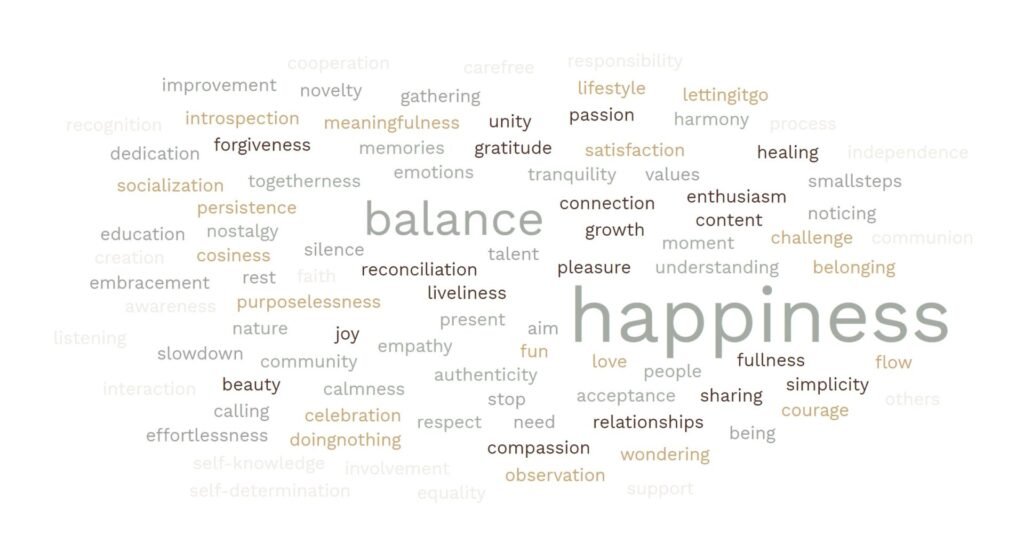Many of us have heard of concepts like siesta, hygge or hakuna matata. There are many such little concepts of happiness around the world. What will happen if we combine them in one comprehensive collection and then extract the essence? What makes us happy and who knows some little secrets about it?
Definition of happiness
Summarizing the popular definitions, we conclude that happiness is about fullness, satisfaction and balance. From culture to culture, we observe small philosophical concepts, completely or partially lost in translation, which best of all hint at what it is actually about. And it is primarily about a certain lifestyle.
Aristotle believed that the way to happiness lies in finding a balance between lack and excess. Read – lagom. He also distinguished four levels of happiness:
- laetus (short-term happiness obtained through the satisfaction of wants, desires, impulses and needs, material happiness);
- felix (happiness obtained by comparing oneself with others, for example, winning a marathon, – also attachment to the ego);
- beatitudo (happiness obtained by doing good to others);
- sublime beautitudo (wholeness and fullness).
Let’s see what fragments of different cultures can add to this in their untranslatability.
Concepts of happiness from different parts of the world

Lagom, Sweden
Not a little, not a lot, exactly what is needed, enough. Lagom is balancing and a sense of measure in everything.
Sisu, Finland
Finns use this concept to briefly describe their national character. Sisu means perseverance in intention, the courage to persist in your actions even when the circumstances are against you, regardless of failure, reacting to stress calmly, accepting a challenge.
Friluftsliv, Koselig, Norway
Friluftsliv means a vow to celebrate life outside, whatever the weather. Only 2 hours a week in nature can improve health and well-being. “There is no such thing as bad weather, only bad clothes” – that’s it.
Koselig is the comfort of accepting the weather conditions that are there, instead of complaining about those that are not. It’s like Danish hygge, only inseparable from nature and more social.

Hygge, Denmark
Because hygge is also about coziness, but more with blankets, a book and a dim light, when it’s raining outside, although it does not exclude socializing, it can be very hygge to cook something delicious together, for example.
Entrückt, Germany
Entrükt is about the state of immersion in oneself, when a person abstracts from the outside world. Some say that it’s about a meditative state, but meditation is more about concentration, and entrükt is simply a distracted immersion in internal flows during, for example, writing, reading, walking. So, maybe it’s the same phenomenon that Mihai Csikszentmihai calls the “wandering mind”, an extremely useful thing between the actual concentration on “serious things”, which allows you to move away from a problem that cannot be solved, and then approach it from another angle and solve.

Craic, Ireland
Kreik, krak or craic – is fun, amusement, a game. Usually, this word refers to socializing at a pub, but you can also have a kreik online because it’s primarily about getting together and sharing stories.
Coorie, Scotland
Coorie means nesting, huddling. But nowadays the Scots put much more meaning into this word: it’s about appreciating simple pleasures, relaxing in the fresh air and feeling comfortable after returning home.
Apprevoise, Flenor, France
Apprevoise means “to tame”, but the French mean forming ties with someone or something as opposed to building walls.
Flenor is an aimless urban wandering and observation of the environment, without rush and stress, maybe with a cup of coffee.
Niksen, Gezelligheid, Netherlands
Niksen is doing nothing for the purpose of doing nothing or without a goal at all. This concept also applies to the wandering of the mind: simply letting it think what it wants, letting life flow without resistance. It might just look like switching from work to starring out the window.
Gezelligheid is a feeling of inner comfort, well-being, which a person shares with others. It can be a sense of belonging, time with friends, time with loved ones, etc.

Siesta, estrenar, Spain
The word siesta can refer both to a break for rest from 2 to 5 p.m., and to a 30-minute nap after a midday meal, when the strength is on the wane. If you want to take a nap, such a rest will definitely benefit you and increase your energy level. There is even such a life hack as nepachino, when a person drinks coffee and goes to sleep for 20-30 minutes – during this time, the coffee exactly has time to act and the person wakes up with a double boost of strength.
Estrenar refers to using something for the first time and the special joy that potentially comes with it. The joy of novelty.
Fare la bella figura, dolce far niente, Italy
Fare la bella figura is about a good, appropriate, decent appearance, making a good impression.
Dolce far niente translates from Italian to the sweet taste of doing nothing. To find joy in simply being here and now without specific goals and “performances”.
Ataraxia, Meraki, Greece
Ataraxia is a state of inner silence, peace and freedom from worries. Letting go and being in the moment, accepting everything as it is, without the need for control or attachment. The concept comes from the philosophies of Epicureanism and Stoicism.

Meraki is about giving yourself over to your work and finding fulfillment and purpose through the expression of your talents and passions. It’s about creating something meaningful and beautiful by immersing yourself in a certain activity.
Keyif, Turkey
Keyif is a rest and rejection of the hustle and bustle. It’s a reminder of simple joys and being in the moment. Sometimes it’s important to stop, listen to those around you, notice things that usually go unnoticed. I think the constant traditional Turkish drinking of tea or sitting on the sun belongs somewhere there.
Japan
Ikigai is the Japanese concept of the intersection of passion, mission, vocation, and profession. It is the ultimate sense of purpose and achievement in life. Finding your ikigai means discovering what brings you joy, what need in the world you can fill, and what you can be rewarded for. A meaningful life in which actions are aligned with values.
Wabi sabi is a celebration of the imperfect, the impermanent, and the simple. The beauty of transience and the natural cycle of prosperity and decay. The beauty of defects, aging, transience, of the usual.

Immersion in nature, and especially in the forest, with a therapeutic purpose is shinrin-yoku. It literally means “forest bath”.
The similar concept is also oganami, the Japanese tradition of enjoying the fleeting beauty of cherry blossoms. It’s a time when people gather with family and friends under the blossoming cherry trees to have a picnic, to celebrate the transience of life and its beauty.
Kaizen is a Japanese philosophy that focuses on continuous improvement and small, incremental changes. This is the idea of constant growth, both personal and professional, through small steps, constant learning and improvement.
Wu Wei, China

In Chinese philosophy, wu wei is a term that can be translated as “non-doing” or “effortless action”. It is a concept that originates in Taoism, emphasizing the importance of being in the natural flow of the universe and acting spontaneously, effortlessly and in harmony with one’s surroundings. It is letting go of the ego’s need for control and allowing things to unfold naturally.
Wu Wei can be practiced in relationships by learning to listen and respond sincerely rather than trying to control or manipulate the other person. It can be applied to work or personal growth, where one focuses on self-discovery and the process and joy of creation, rather than chasing achievement or success.
Guyub, Java (Indonesia)
Guyub is a feeling of community, unity or solidarity within a community or group of people. It conveys the idea of harmony, a sense of belonging and mutual support. This concept emphasizes the importance of maintaining strong social ties and cooperation between community members. Guyub talks about the value of common welfare and the idea that people are interconnected and should support each other.
Pakikipagkapwa-tao, Philippines
Pakikipagkapwa-tao is about the idea of interconnectedness and treating others as equals, the importance of recognizing and respecting the humanity in each person, regardless of social status or background. Pakikipagkapwa-tao encourages empathy, compassion, and the belief that our actions should contribute to the well-being and harmony of society as a whole. Meaningful relationships, fostering a sense of belonging and active participation in the collective well-being: interactions with others can shape not only their lives, but our own as well.

Ubuntu, Africa
Ubuntu is about reciprocity, responsibility and community. Ubuntu expresses the idea that our existence is connected to other people, and that we develop by communicating and interacting with each other while maintaining our own authenticity.
Hakuna Matata, Kenya
One day everything will be fine, so don’t worry because the situation is out of our hands. Stress doesn’t help, it just makes us miserable in a situation we can’t influence. So there is no point in stressing. Kenyans are deeply imbued with this concept, which is why it is so easy in their company.
Saudade, Brazil, Portugal
Saudade is a feeling of nostalgia and melancholy caused by the loss or distance from something dear. Bittersweet, the beauty of complex emotions.

Buen Vivir, Ecuador
Buen vivre is to live well, and to live well means in a harmonious community, in harmony with nature, with each other and with one’s inner values. Understanding and respect for nature, interacting with other people based on justice and equality, harmony between body and soul, and self-determination and independence.
Pura Vida, Costa Rica
Pura Vida – from Spanish “pure life” or “simple life”. It’s about a spirit of optimism, contentment and gratitude for the present moment, a mindset to live life to the fullest, cherish the beauty of the world, find joy in even the simplest things, embrace a more peaceful and carefree way of life, slow down, connect with nature and develop relationships with others.
Jois du Vivre, Canada
From French – joy of life: appreciation of simple pleasures and every moment. An integral part of this concept is nature, and in particular active recreation in nature. Connection, enthusiasm, celebration.

Ho’oponopono, Hawaii
Ho’oponopono is a traditional Hawaiian practice that revolves around forgiveness, reconciliation, and personal responsibility. The word itself can be translated as “fix” or “correct the error”. It is a deeply meaningful concept that promotes healing and harmony within oneself and in relationships. Ho’oponopono is based on the belief that our thoughts, actions and emotions affect not only ourselves, but also the world around us. It encourages people to take responsibility for their actions and seek forgiveness and reconciliation with others. The practice usually involves facilitated dialogue or mediation, where people express their feelings, listen to each other without judgment, and work toward resolution and healing. Ho’oponopono teaches you to let go of resentment, anger, and negative emotions, replacing them with forgiveness, love, and compassion. It encourages us to see the humanity in others and develop a sense of unity and understanding.
In the summary
In order to simplify these concepts to words we understand, I decided to make a cloud of words that explain all these things. Here’s the result.

Books about happiness
Some further reading on the subject.
- “Happiness: A Guide to Developing Life’s Most Important Skill” by Matthieu Ricard
- “Flow: The Psychology of Optimal Experience” by Mihaly Csikszentmihalyi
- “Stumbling on Happiness” by Daniel Gilbert
- “The Book of Joy: Lasting Happiness in a Changing World” by Dalai Lama and Desmond Tutu
- “The How of Happiness: A New Approach to Getting the Life You Want” by Sonja Lyubomirsky
- “Happiness: A History” by Darrin M. McMahon
- “The Art of Happiness” by Dalai Lama and Howard Cutler
- “Pursuits of Happiness: Well-Being in Anthropological Perspective”, Gordon Mathews and Carolina Izquierdo.



